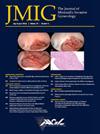视频游戏对腹腔镜技能的影响:前瞻性随机对照试验与质量改进项目
IF 3.5
2区 医学
Q1 OBSTETRICS & GYNECOLOGY
引用次数: 0
摘要
研究目的比较使用和不使用不同控制器的视频游戏热身时医科学生在 LapMentorTM 技能测试中的表现,并确定视频游戏对妇产科住院医师使用模拟器频率的影响.设计结合 QI 项目的前瞻性 RCT.设置克里顿大学医学院妇产科.患者或参与者医科学生和妇产科住院医师.干预措施首先,将学生随机分组:第一组(使用标准 WiiUTM 视频游戏控制器进行地下游戏热身)、第二组(使用定制腹腔镜控制器进行地下游戏热身)和第三组(不进行热身)。学生们根据所分配的组别,在经过验证的腹腔镜模拟器(LapMentorTM)上完成了前测和后测。接着,向妇产科住院医师发放了一份关于腹腔镜技能模拟器使用情况的前测问卷。他们在获得 WiiUTM 视频游戏系统(包括定制控制器和 UndergroundTM 视频游戏)后完成了测试后问卷:方差分析使用了前测和后测的数据,混合模型则包括了未参加后测的参与者。对所有参与者进行了分组分析,仅对完成了每一项 LapMentorTM 任务的参与者进行了分组分析。无论采用哪种分析方法,从测试前到测试后,各组的测试成绩均有明显下降(p<0.001),且在测试前和测试后没有组间差异。在项目的第二部分,为住院医师提供 WiiUTM 视频游戏系统后,腹腔镜模拟器的使用率与之前相比有显著的统计学增长(P=0.027)。此外,为妇产科住院医师提供 UndergroundTM 视频游戏与提高腹腔镜模拟器的使用率有关。本文章由计算机程序翻译,如有差异,请以英文原文为准。
The Effect of Video Games on Laparoscopic Skills: A Prospective Randomized Controlled Trial and Quality Improvement Project
Study Objective
To compare medical students’ performance on LapMentorTM skills tests with and without the use of a video game warmup with different controllers and to determine the effect of a video game on the frequency of simulator use in OB/GYN residents.
Design
Prospective RCT combined with a QI project.
Setting
Department of OB/GYN at Creighton University School of Medicine.
Patients or Participants
Medical students and OB/GYN residents.
Interventions
First, students were randomized into groups: Group 1 (warm-up with UndergroundTM game using standard WiiUTM video game controller), Group 2 (warm-up with UndergroundTM game using custom-made laparoscopic controller), and Group 3 (no warm-up). Students completed a pretest and posttest on a validated laparoscopic simulator (LapMentorTM) according to their assigned group. Next, a pre-test questionnaire on the use of simulators for laparoscopic skills was given to OB/GYN residents. They completed a post-test questionnaire after being provided with a WiiUTM videogame system that included a custom controller and UndergroundTM video game.
Measurements and Main Results
Two analyses were performed for the first part of the project: ANCOVA, which used data from the pretest and posttest, and the mixed model, which included participants who did not return for the posttest. Subgroup analysis was conducted on all participants and only those who completed every LapMentorTM task. A statistically significant (p<0.001) decrease from pretest to posttest was constant across groups, regardless of analysis, with no between-group differences at time of pretest and posttest. For the second part of the project, there was a statistically significant increase in laparoscopic simulator use after providing residents with a WiiUTM video game system as compared to prior (p=0.027).
Conclusion
The use of a video game warm-up is associated with faster completion of laparoscopic skills tests in medical students regardless of controller type. Additionally, providing OB/GYN residents with access to the UndergroundTM video game is associated with increased use of the laparoscopic simulator.
求助全文
通过发布文献求助,成功后即可免费获取论文全文。
去求助
来源期刊
CiteScore
5.00
自引率
7.30%
发文量
272
审稿时长
37 days
期刊介绍:
The Journal of Minimally Invasive Gynecology, formerly titled The Journal of the American Association of Gynecologic Laparoscopists, is an international clinical forum for the exchange and dissemination of ideas, findings and techniques relevant to gynecologic endoscopy and other minimally invasive procedures. The Journal, which presents research, clinical opinions and case reports from the brightest minds in gynecologic surgery, is an authoritative source informing practicing physicians of the latest, cutting-edge developments occurring in this emerging field.

 求助内容:
求助内容: 应助结果提醒方式:
应助结果提醒方式:


